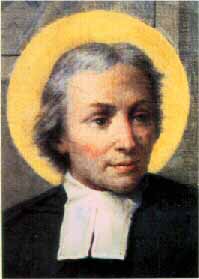|
¡@
St. John Baptist de La Salle
St. John Baptist de La Salle was born is
Rheims, France in 1651. His childhood days were spent during the period of
French history known as the 'Splendid Century' and was marked by endless wars
and intermittent disturbances. The gap between the rich and the poor widened to
an unprecedented extent: the former lived in lavishness, the latter in abject
poverty.
Born in this morally and politically unstable era, St. La Salle was a descendant
of a distinguished family. This did not blind him to the sufferings many other
under-privileged peasants were experiencing at that time.

St. John Baptist de La Salle
Although little is known about his childhood, it seems that
John Baptist decided to take on a priestly career at an early age. He received
Christian education, and at the age of 19, entered the seminary of Saint Sulpice
in Paris to prepare for priesthood. There, John Baptist found later turned out
to be his future work - teaching.
In 1678, John Baptist was ordained priest, and from then on, started his life of
teaching. In 1679, he took part in constituting a charity school for boys in
France. At first, he met with numerous obstacles. He found the students
undisciplined, the teachers poorly trained and worst of all, both the students
and the worst of all, both the student and teachers of the newly formed school
were alienated by traditional educators and teachers.
John Baptist made much effort to eliminate these difficulties. Realizing that
"Good teachers make good schools and good schools make good men", he believed
that the teachers could only be improved by proper training, and decided to let
the teachers live with him, himself acting as the teachers' trainer. Although
his action was at first controversial, it was later proved appropriate, as in
1684, he already had seven such schools running smoothly in Rheims.
Perhaps John Baptist's most significant contribution towards the entire industry
of education in France was that he was able to bring education to children of
all classes. Before his revolution, education in most European countries was
only limited to the upper-class and those who could afford it financially. John
Baptist later formed a religious organisation composed of 12 other teachers, the
nucleus of the Christian Brothers with himself as the president. The
organisation was founded upon his vision that everyone receive proper education
and moral training.
John Baptist was shunned by many sides of French society. His teachings with
French as a medium instead if Latin were greatly criticised by traditional
teachers, who believed that Latin was the only truly civilised language suitable
for teaching. But John Baptist stood fast and continued his work, while
constantly improving the quality of education he was offering. New schools were
opened, and John Baptist de La Salle's name became famous throughout France.
John Baptist's success was substantial, but he never became proud overjoyed by
his rewarding works. In fact, he always tended to hide behind his work, often
gave credit to his teachers and helpers. In 1717, he stepped down from the
leadership of the organisation, but remained a great influence on the Brothers
and their fellows.
From devotion almost all his life to reforming education in France, John Baptist
was gradually weakened physically. He died on Good Friday, April 7, 1791. He was
canonised in 1900 by Pope Leo XIII and proclaimed 'Patron of all Teachers' by
Pop Pius XII in1951. His feast day is celebrated on May 15.
The Christian Brothers (De La Salle Brothers) are now known the world over.
Today 15,000 Christian conduct schools, colleges and universities in some 80
countries and their pupils number hundreds of thousands. In Asia, the Brothers
have establishments in Burma, Cambodia, Ceylon, Hong Kong, India, Japan,
Malaysia, Pakistan, the Philippines, Singapore, Thailand and Vietnam.


More details on:
|
¡@ |
|

